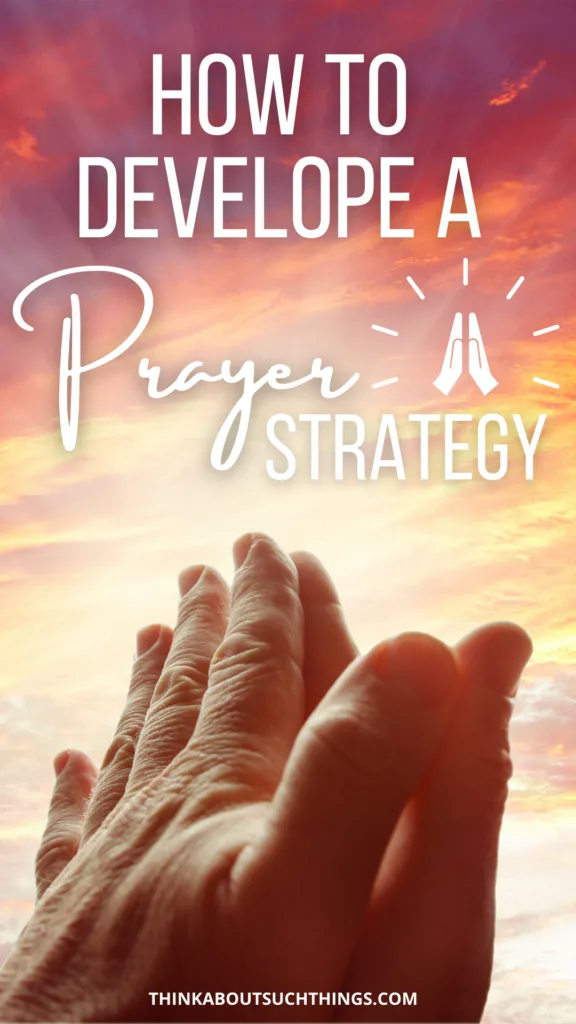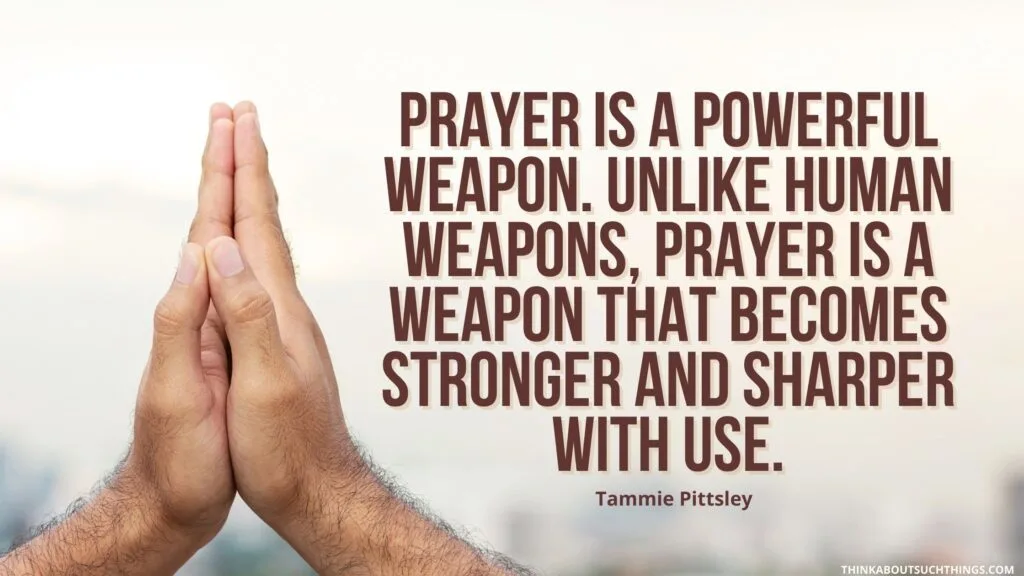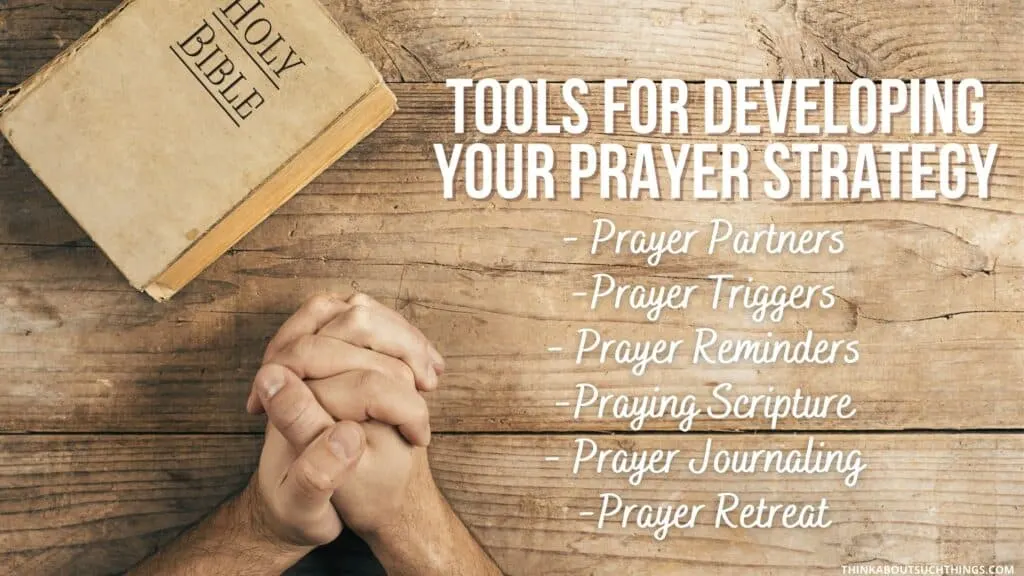In this guest article we will hear from Tammy Pittsley. She will guide us practically on how to develop a prayer strategy that will help us grow in our relationship with the Lord. So, come with a open heart to learn…
Before you can develop a prayer strategy you must understand what one is and why you need one. The most common use of the term – and the first definition of ‘strategy’ on merriam-webster.com – refers to “political, economic, psychological, and military forces” that are used to achieve peace or pursue war.
In this regard, using the term ‘strategy’ in relation to prayer is very appropriate because prayer is one very important weapon in our spiritual battles.
However, strategy can also be used in a less intense manner. The second definition of the word is “a careful plan or method.” And this is what you need to focus on as you create your personal prayer strategy.
The bottom line is this: you need to develop a prayer strategy because you need a plan for prayer. And you need a plan for prayer because the moment you said, “Save me, Lord!” you were enlisted in a spiritual army that has fought and will continue to fight intense spiritual battles until Commander Jesus wins the final battle.
To be effective in this spiritual battle, your weapons need to be honed – or sharpened & prepared – and always ready for use. Imagine going into battle without a weapon, body armor, or training. You’d not only fail, but you’d also endanger others.

That’s the same reason you need a prayer strategy. Prayer is a powerful weapon. Unlike human weapons, prayer is a weapon that becomes stronger and sharper with use. As you wield the weapon of prayer, you win spiritual battles and strengthen your “shield of faith” (Ephesians 6:16) which is your ‘body armor’ or protection.
Now that you know what a prayer strategy is and why you need one, let’s look at how you can develop your prayer strategy.
>> Want to grow more in prayer? Check out more articles on Prayer and Intercession!
Questions to Ask as You Develop Your Prayer Strategy
It is easy and normal to assume you know what you need to include in your prayer strategy. Especially if you were raised in the church or have been a Christian for a long time, you probably think you have a pretty good handle on this prayer thing.
And maybe you do.
But maybe you have overlooked some aspects of a prayer strategy that you need to focus on now. Or perhaps you’re clueless about where to begin. Or maybe you fall somewhere in the middle.
Wherever you are right now, asking yourself the following questions – and answering them honestly and after reflection and prayer (who knew?) – can help you to develop a prayer strategy that meets your needs in this season of life. [NOTE: keep these questions close, because as your seasons change, so will your prayer strategy].
As you develop your prayer strategy, start by asking the reporter’s standard “5W’s and an H” questions. Below are some sample questions to ask for each of these. This is just a get-your-brain-thinking list. It isn’t exhaustive and you don’t need to answer all these questions. But it’s a place to start. Don’t move on until you’ve asked and answered at least one question in each category.
WHO
Who will you model your prayer strategy after? [A prayer warrior you read about? Someone in the Bible? A relative?]
Who needs your prayers daily or weekly? [Your family, friends, church? Who else?]
WHAT
What is your goal in developing a prayer strategy? [What’s your big picture goal?]
What do you need your plan to help you accomplish? [Knowing what you want to accomplish will clarify your strategy]
WHEN
When will you meet the Lord in prayer as a sacred appointment? [this should be daily]
When will you spend extra time in prayer for urgent needs? [can you carve out an hour or two additionally each week?]
WHERE
Where will you have your regular prayer time? [this should be the same place every day]
Where else can you pray when you regularly routines are interrupted? [life happens, what’s your backup plan?]
WHY
Why is being faithful to your prayer plan important to you? [write this out and read it to yourself when you struggle with consistency]
Why do you believe in the necessity of prayer? Is this just what you’ve been taught or is it a personal belief you hold dear? How can you move from the first to the second?]
HOW
How will you remember to pray for specific needs? [a notebook? journal? note app on your phone? photographic memory?]
How will you recognize God’s answers when they come? [write things down so you recognize answers when they come]
How will you praise and give thanks for answered prayer? [don’t leave this out!]
How will you keep your faith strong in the faith of unanswered prayer? [yes, you will have unanswered prayers – and prayers that are answered ‘no’ when you so desperately wanted a ‘yes.’]
Write Out Your Prayer Strategy
After taking the time to consider several questions, you will begin to have a clearer picture of what your prayer strategy needs to be during this season. Keeping those answers close – you wrote them down, right? – begin writing out your personal plan for prayer.
This shouldn’t be overwhelming and will probably take only a few sentences. Below is an example of what a prayer strategy framework might look like.
“My prayer strategy: I will get up every day at 5:30 and spend time in the Word and in prayer before I wake the children at 6:30. At least 20 minutes of this time will be for praying over the needs of my family, friends, church, and world. I will also pray over my own needs, especially for the day ahead. I will meet the Lord during this time at the kitchen island (with my coffee!) and use a journal to write notes about who and what I am praying over.
I will begin my prayer time by reading a psalm and offering praise and worship. I will end my prayer time in thanksgiving for answered prayers and answers still to come. I will also spend 5 minutes most days looking up and praying verses related to spiritual strongholds my family or I am currently facing.”
Continue to Refine Your Prayer Strategy

So, you have a set aside time and place for prayer. You have a reminder system, such as a journal in place. You have the names and needs of those close to you as well as the world at large. You good to go with your prayer strategy.
Then life interrupts. Because it always does.
You plan to get up 30 minutes before the kids, but no matter how early you set the alarm, at least one of them is up within 10 minutes (been there, done that).
You pull an all-nighter with a teething baby and can’t think straight let alone pray (also been there, done that).
You decide it’s time to return to college, the kids are all in high school or graduated, and suddenly your schedule is crammed full, and your carefully made plans evaporate. You’re not sure you even remember to brush your teeth some days – how in the world are you going to keep a prayer schedule?? (yep – been there too).
Here’s the thing you need to know – your prayer strategy (or plan) – is just that: a plan. It isn’t Holy Scripture or an immovable object. It is a starting point and an anchor.
You have the plan, and you try to follow it – but when you can’t, you can still pray. And one of the things you should be praying is, “Lord, show me where to make the time for prayer in my crazy day and life.”
If you are faithful as much as possible, the Lord with help you figure out how to adjust. Because, trust me, He wants to spend time with you far more than you want to spend time with Him. Ask for His help and things will fall into place. Of course, they won’t stay there – but you know what to do when life changes again.
Think of it like this: in an actual war, on the battlefield, nothing ever goes according to plan. But the soldiers adjust, they adapt, they keep fighting. It’s no different for you in a spiritual battle. The most important part of your prayer strategy is the commitment to continue praying no matter what. “Failure is not an option” as Churchill so eloquently said many years ago.
Tools for Developing Your Prayer Strategy

When you consider how to develop a prayer strategy – and consider how that relates to fighting a battle – you need to also remember that in battle, soldiers seldom have only one weapon. And they are seldom alone.
With that thought in mind, here are some tools – or weapons – you might want to consider adding to your plan:
- Prayer Partners: no soldier intentionally goes into battle alone – and neither should you.
- Prayer triggers: like setting an alarm for 12:30 every afternoon to pray for the most pressing global needs of the day or praying for your pastor every time you drive past a church building.
- Prayer reminders: you probably already know at least 1 – the ACTS prayer formula. It is simply a reminder not to leave out any essentials. Other reminders include the 5-finger prayer, the PRAY acronym, and the PUSH acronym. You can find others by searching the Internet.
ACTS: Adoration, Confession, Thanksgiving, Supplication
5-Finger Prayer: Thumb for those closest to you, index finger for teachers & instructors, middle finger for those in authority, ring finger for the weak and sick, pinkie for yourself as the least.
PRAY: Praise, Repent, Ask, Yield
PUSH: Pray Until Something Happens
- Praying Scripture: are you struggling with disciplining your children? Look up Bible verse about discipline and obedience to parents (or whatever the area of concern is), write those verses on index cards or in your journal and pray them daily. You can text the verses to yourself or include them on a notes app so you can pray them throughout the day. Make the prayers personal by putting your name and your child’s name in the verses. Use this same method for any area of concern.
- Prayer Journaling: writing out your prayer longhand can slow your mind and focus your thoughts such that you can more clearly hear and understand God’s Word & His Spirit.
- Prayer Retreat: whenever you feel like your prayers aren’t getting past the ceiling, see if you can carve out a half-day for a mini-retreat. Focus on confession and repentance first to ‘clear the air’ and ensure nothing is hindering your prayers. Then spend time in worship, intercession, praying Scripture, and pleading for guidance and blessing.
>> Check out 20 Ways you can pray for the church
Conclusion
Having a plan, or a prayer strategy, can make you a more effective prayer warrior. You’ll be more intentional, more faithful, more focused, and more consistent in your prayer life with a prayer strategy.
I have provided you with the basic tools for creating your personal prayer strategy. I urge you to do so sooner rather than later. Your prayers matter more than you’ll ever know this side of heaven.
One last thing to remember: there is no one ‘right way’ to pray (as long as you’re praying to the One True God and Jesus His Son). Develop your prayer strategy in such a way that you’ll pray more, and it’ll be the right strategy. The only way to do prayer wrong is to not pray.
About the Author

Tammie Pittsley blogs at lifeloveandjesus.com where she encourages, teaches, and provides tools for Christian women to live an authentic faith in the midst of the messiness of families by grounded thoughts, words, and actions in the love of God, the truth of the Gospel, and the grace of redemption.

Melissa is a passionate minister, speaker and an ongoing learner of the Bible. She has been involved in church and vocational ministry for over 18 years. And is the founder of Think About Such Things. She has the heart to equip the saints by helping them get into the Word of God and fall more in love with Jesus. She also enjoys family, cooking, and reading.
She has spoken in churches in California, Oregon, Texas, and Mexico and has been featured in Guidepost Magazine and All Recipes Magazine. Read More…
